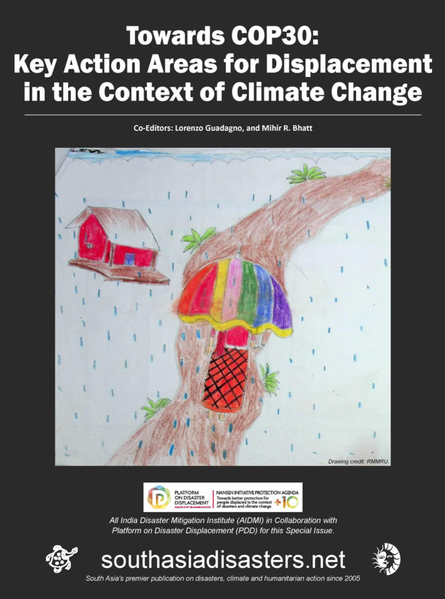
This issue of Southasiadisasters.net, titled “Towards COP30: Key Action Areas for Displacement in the Context of Climate Change,” focuses on displacement as a reflection of the human cost of environmental challenges. It explores migration, planned relocation, and involuntary movements triggered by extreme weather events or slow-onset disasters such as rising sea levels. Addressing these challenges requires equitable climate finance, rights-based policies, and integrated planning to minimize impacts and build resilience.
Featured articles:
- Despite Progress Made, We Cannot be Satisfied by Walter Kälin, Envoy of the Chair of Platform on Disaster Displacement, Switzerland
- The Many Facets of Human Mobility in Climate Policy and Action by Lorenzo Guadagno, Platform on Disaster Displacement, Switzerland
- We Belong Together: Human Mobility and Climate Change Negotiations by Ileana Sînziana Pușcaș, International Organization for Migration (IOM), Switzerland
- Climate Change: Different Human Mobility Implications, Different Responses by MA. Adrián Martinez, and Maria Paula Calvo Barboza, La Ruta del Clima, Costa Rica
- Intersections of Climate Change, Migration, and Modern Slavery: A Cycle of Debt Traps, Distress, and Despair by Shakirul Islam, Ovibashi Karmi Unnayan Program (OKUP), Bangladesh
- Why Does UNFCCC COP29 Matter in Addressing Human Mobility in the Context of Climate Change by Soumyadeep Banerjee, Climate Action Division, International Organization for Migration (IOM), Austria
- Climate-related Human Mobility in Adaptation Frameworks by Dennis Mombauer and Marek Szilvasi, SLYCAN Trust, Sri Lanka and Germany
- Climate Displacement and Land Access: Lessons from Bangladesh by Lutfor Rahman and Juel Mahmud, International Centre for Climate Change and Development (ICCCAD), Bangladesh
- Displacement and Loss and Damage at COP29: A Perspective on Catalyzing Technical Assistance through the Santiago Network by Timo Schmidt, United Nations Office for Project Services (UNOPS), Switzerland
- Durable Solutions to Displacement: ‘Raising the Bar’ in Loss and Damage Discourse and Practice by Steven Miron, Refugee Law Initiative, School of Advanced Study Univerisity of London, United Kingdom
- Accounting Starts with Counting: Including Displacement Data into Loss and Damage (L&D) Assessments by Vicente Anzellini, Alice Baillat, and Sylvain Ponserre; Internal Displacement Monitoring Centre (IDMC), Norwegian Refugee Council, Switzerland
- Leveraging Climate and Humanitarian Data for Loss and Damage by Jeremy Wetterwald, IMPACT Initiatives, Switzerland
- Reframing Climate Mobility: A Decolonial and Feminist Analysis of COP29 by Lauren Grant, Beyond Climate Collaborative and Gabriela Nagle Alverio, Beyond Climate Collaborative & Duke University, United States
- Beyond Climate: Addressing the Socio-Political Drivers of Displacement – A Call for Action at COP29 by Hyeonggeun Ji and Rodrigo Mena, The Hague Humanitarian Studies Centre (HSC), International Institute of Social Studies (ISS); Erasmus University Rotterdam, Netherlands
- Climate Mobility and Decent Work: Addressing Severe Rights Violations through International Climate Policy by Cristina Patriarca, Anti-Slavery International, United Kingdom
- Saving Lives at Work: Heat Stress and Migrant Workers in a Warming World by Paul Tacon, Katherine Velastegui, and Halshka Graczyk; International Labour Office (ILO), Switzerland
- Let the Displaced Lead: Displacement in the Context of Climate Change by Mihir R. Bhatt, All India Disaster Mitigation Institute (AIDMI), India